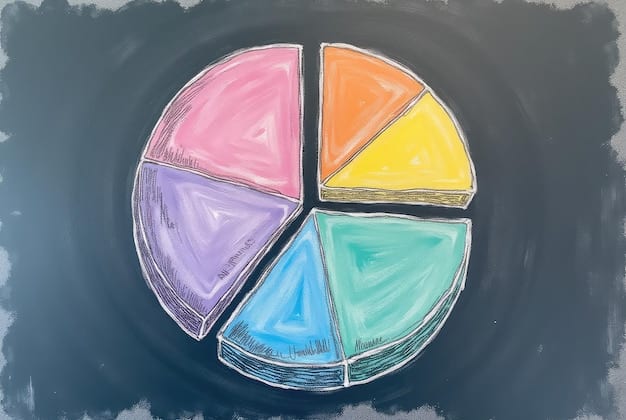Budgeting for Students: Master Savings in Australia

Budgeting for Students: Maximise Your Savings While Studying in Australia involves creating a financial plan to manage income and expenses effectively, ensuring you can cover essential needs, educational costs, and leisure activities while minimising debt and building financial stability during your studies.
Navigating the financial landscape as a student in Australia can be challenging, but with the right strategies, you can thrive both academically and financially. Budgeting for Students: Maximise Your Savings While Studying in Australia is your key to unlocking financial freedom and making the most of your educational journey.
Understand Your Financial Landscape
Embarking on your studies in Australia also means getting to grips with the financial aspects of student life. From course fees to living expenses, understanding where your money goes forms the bedrock of successful budgeting.
Identify Your Income Sources
Before you can start budgeting, you need to know your income. This could be from various sources, from part-time work to family contributions. Consider these aspects:
- Part-Time Jobs: Many students work part-time to support themselves. Be aware of limitations to your visa, and ensure that your work schedule doesn’t affect your study commitments.
- Family Support: Some students receive financial assistance from their families. Ensure that you have a clear understanding of the amount and frequency of this support.
- Scholarships & Grants: If you’re fortunate enough to have a scholarship or grant, incorporate this money into your budget. Keep in mind that these may have specific conditions or schedules for disbursement.
Track Your Expenses
Tracking your expenses is crucial to see where your money is going. You might be surprised at how much those daily coffees or weekend outings add up to. Here are some ways to monitor:
- Budgeting Apps: There are several apps available that can help you track your spending. Apps like Pocketbook or Frollo are Australia-based and link directly to your bank accounts to provide detailed spending reports.
- Spreadsheets: If you prefer a more hands-on approach, create a simple spreadsheet to list your income and expenses.
- Notebook: A simple notebook can work too, especially if you’re just starting. Just write down everything you spend, and check it from time to time.
Understanding your financial landscape, identifying your income, and meticulously tracking expenses will pave the way to effective budgeting. Staying organised will make it easier to spot areas where you can save and give you a clearer view of your financial health as a student.
Create a Realistic Budget
Once you know your income and expenses, you can begin crafting a budget which is crucial for financial success. This will dictate where your money goes and help you avoid overspending.
Prioritise Needs and Wants
Distinguishing between essential needs and discretionary wants is key to a robust budget. Ensure your needs are met first. Here’s how to do it:
- Needs: These include rent, groceries, transport, textbooks, and health insurance. These are your essentials and should be non-negotiable.
- Wants: These include eating out, entertainment, new clothes, and the latest gadgets. These are things that are nice to have, but not essential.
Set Attainable Financial Goals
Setting specific financial goals can help you stay motivated with your budget. Whether saving for a trip or paying off a student loan, having a clear goal in mind makes budgeting more relevant. Consider these when setting your goals:
- Short-Term Goals: Saving for a concert, buying a new textbook.
- Mid-Term Goals: Saving for a holiday, buying a used car.
- Long-Term Goals: Paying off student loans, saving for a deposit on an apartment.

Creating a realistic budget involves prioritising needs over wants and setting achievable financial goals. Once you have created and implemented your budget, you’re in a much better situation to see where you can save and grow financially.
Find Accommodation That Fits Your Budget
Accommodation is often the largest expense for students in Australia. Finding an affordable option can significantly affect your ability to save.
On-Campus vs. Off-Campus Living
When thinking about where to live as a student, consider the differences in lifestyle and cost between on and off-campus housing.
- On-Campus: On-campus often provides convenient access to classes and campus facilities.
- Off-Campus: Renting a room or apartment away from the university may be cheaper than living on-campus.
Explore Different Suburbs
The cost of living varies significantly across different suburbs in Australian cities. Consider living in a suburb further from the city centre, as these tend to be more affordable. Using public transport regularly may involve a trip on public transport but it will still save you money.
Choosing accommodation wisely is a crucial step in ensuring financial stability as a student. By considering alternatives and being adaptable, students can greatly reduce their living expenses and improve their overall financial health.
Master the Art of Frugal Eating
Food expenses can quickly add up for students, but with careful planning and smart shopping, you can greatly reduce these costs. Let’s dive into smart strategies that save on money.
Plan Your Meals
Planning your meals for the week is a great method for saving on expenses. Not only does planning your meals allow you to buy only what you need, but it also prevents those impulse purchases that can quickly eat into your budget.
Cook at Home
Eating out might be convenient, but it can cost a lot more than cooking your own meals. Make cooking at home a habit to save money and also to learn what ingredients are more expensive than others.
By mastering the art of frugal eating, students can significantly reduce their expenses and improve their overall financial health. With careful planning, smart shopping, and a shift in mindset, students can enjoy nutritious meals without emptying their wallets.
Make the Most of Student Discounts and Resources
One advantage to being a student is the wide range of discounts and resources available. These can help you save money on everything from transport to entertainment.
Student Cards
Your student card is your key to unlocking many discounts. From movie tickets to gym memberships, always carry your student card with you.
Free or Low-Cost Entertainment
Free entertainment is a great way to save money and unwind from your studies. Fortunately, most of it is already available.
- University Events: Keep an eye out for free events and activities hosted by your university. These can be a fun way to socialize without spending any money.
- Public Parks and Beaches: Australia boasts beautiful parks and beaches where you can relax, exercise, or meet with friends.
- Free Museums and Galleries: Many museums and art galleries offer free admission on certain days or evenings.
Leveraging student discounts and resources is a savvy way for students to save on essential expenses and enjoy leisure activities without breaking the bank. From transport to entertainment, the opportunities for savings are vast. By being proactive and resourceful, students can significantly improve their financial health and make the most of their time in Australia.
Manage Transportation Costs
Transportation can be a significant expense for students, but there are ways to navigate it without spending too much. From bikes to discounts, you have options.
Public Transport Discounts
Many Australian cities provide discounted fares for students on public transport. Check with your local transport authority to see if you are eligible. This can reduce the amount you spend per journey considerably.
Consider Cycling or Walking
If possible, consider cycling or walking to your classes. It’s not only a free way to travel, but it’s also a great way to stay active. Make sure to wear a helmet and follow traffic rules.

Managing transportation costs effectively is crucial for students looking to save money. There are several strategies to reduce transport expenses if you put your mind to it. From student discounts on public transport to cycling, there are numerous ways to save.
| Key Area | Brief Description |
|---|---|
| 🏠 Housing | Choose affordable options like shared housing or off-campus locations. |
| 🍽️ Food | Plan your meals, cook at home, and avoid eating out frequently. |
| 🎟️ Discounts | Use student cards for discounts on transport, entertainment, and more. |
| 🚌 Transport | Take advantage of student fares and consider cycling or walking. |
Frequently Asked Questions
▼
Use budgeting apps, spreadsheets, or a notebook to monitor your spending. Regularly review your expenses to understand where your money goes.
▼
Plan your meals, cook at home more often, buy in bulk, look for discounts, and reduce eating out. Avoid buying snacks impulsively.
▼
Consider living in shared housing, look for options off-campus, and explore suburbs farther from the city center. Check university housing for subsidized rates.
▼
Use your student card for discounts on transport, entertainment, and books. Check for student deals at universities, local businesses, and online platforms.
▼
Setting financial goals provides motivation and direction for your budgeting efforts. Goals help prioritize spending and track progress toward your financial aims.
Conclusion
Budgeting for Students: Maximise Your Savings While Studying in Australia doesn’t have to be a struggle. By implementing these strategies, you can manage your finances wisely, avoid excessive debt, and enjoy your education without constant financial stress, setting yourself up for a secure and successful future.





